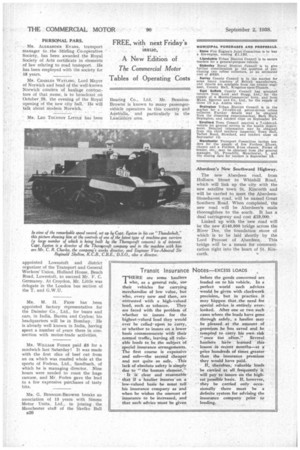Transit Insurance Notes—EXCESS LOADS
Page 30

If you've noticed an error in this article please click here to report it so we can fix it.
THERE are some hauliers
who, as a general rule, use their vehicles for carrying merchandise of low value, but who, every now and then, are entrusted with a high-valued load, such as tobacco. They are faced with the problem of whether to insure for the highest-valued load they would ever be called' upon to carry, or whether to insure on a lower basis commensurate with their normal traffic, leaving all yaluable loads to be the subject of special insurance arrangements. The first course is expensive and safe—the second cheaper and not quite so safe. This lack of absolute safety is simply due to " the human element."
• It is clear and reasonable that if a haulier insures on a low-valued basis he must tell his insurance company as and when he wishes the amount of insurance to be increased, and that such advice must be given before the goods concerned are loaded on to his vehicle. In a _perfect world such advices would be given with clockwork precision, but in practice it may happen that. the need for special advice is entirely overlooked. After one or two such cases where the loads have gone• through safely, a haulier may be pleased, at the amount of
• premium he has saved and be tempted to carry his own risk
• "once too often,"hauliers have leared • this
• lesson in recent months—at price hundreds of times greater than the insurance premium they would have paid.
• If, therefore, valuable loads be carried at all frequently it • will pay to insure on the highest possible basis. If, however, they be carried only occasionally there must be a definite system for advising the insurance company prior to • loading.




















































































